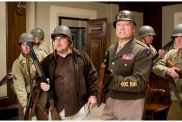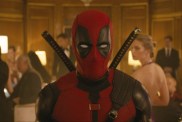Like BlackBerry, Flamin’ Hot is a comedic product “biopic” that probably isn’t strictly true, but serves a larger purpose as an allegorical narrative. Where the former movie encapsulated the struggle of the past few decades between “nerd culture” and commerce, Flamin’ Hot works as a metaphor for the integration of Mexican immigrants and their influence on mainstream culture. Director Eva Longoria has been vocal about the fact that, if this movie doesn’t work, she probably won’t get another chance at the helm and has left it all on the field in an attempt to make the definitive American Dream story for Mexican Americans.
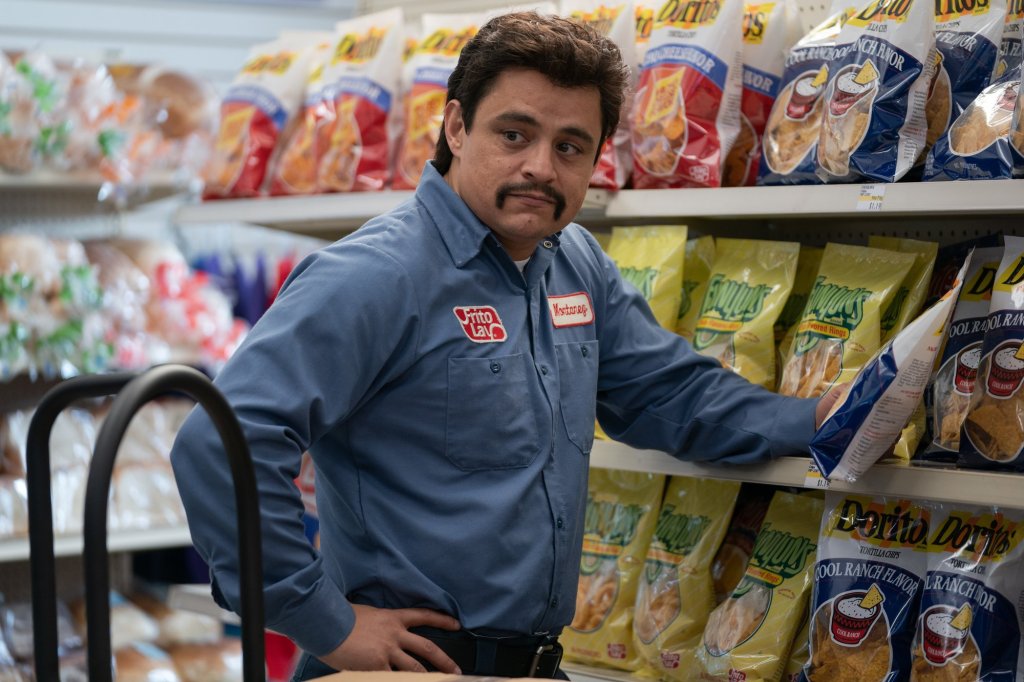
From the salsa-style take on the Fox fanfare at the beginning of the movie to touches of magic realism throughout, Flamin’ Hot is to movies what Flamin’ Hot Cheetos have been to snacks: a corporate outreach to an underserved market. A market that wants products which represent them and their tastes. It may face the same obstacle that, according to the movie, the snacks initially did – will the target audience know this exists? We’ll see if Longoria proves to be as creative a marketing genius as the film’s main character, Richard Montanez, apparently was. Played here by Jesse Garcia (Quinceanera), Montanez is the man who claims to have invented the Flamin’ Hot Cheetos flavor as a janitor, which got him promoted to the role of vice president of multicultural sales and community promotions. Garcia’s mostly appeared in bit parts before, but like Montanez, he absolutely merits the professional advancement.
Keeping It Real?
Montanez’s account has been disputed, and indeed, some plot points in his story are verifiably false. For one, PepsiCo CEO Roger Enrico (Tony Shalhoub) only became CEO after Flamin’ Hot Cheetos were already testing. Many of the discrepancies, however, can be accounted for by the fact that while Frito-Lay may have been testing other spicy blends at the time, Montanez could have invented the particular blend they ended up using. The movie acknowledges this; it also acknowledges – via deliberately fake alternate versions of certain scenes — that Montanez likes to embellish his own story and may be an unreliable narrator. A kinder way to put that might be that he’s engaging in magical realism, as when Enrico starts talking directly to him on a video tape.
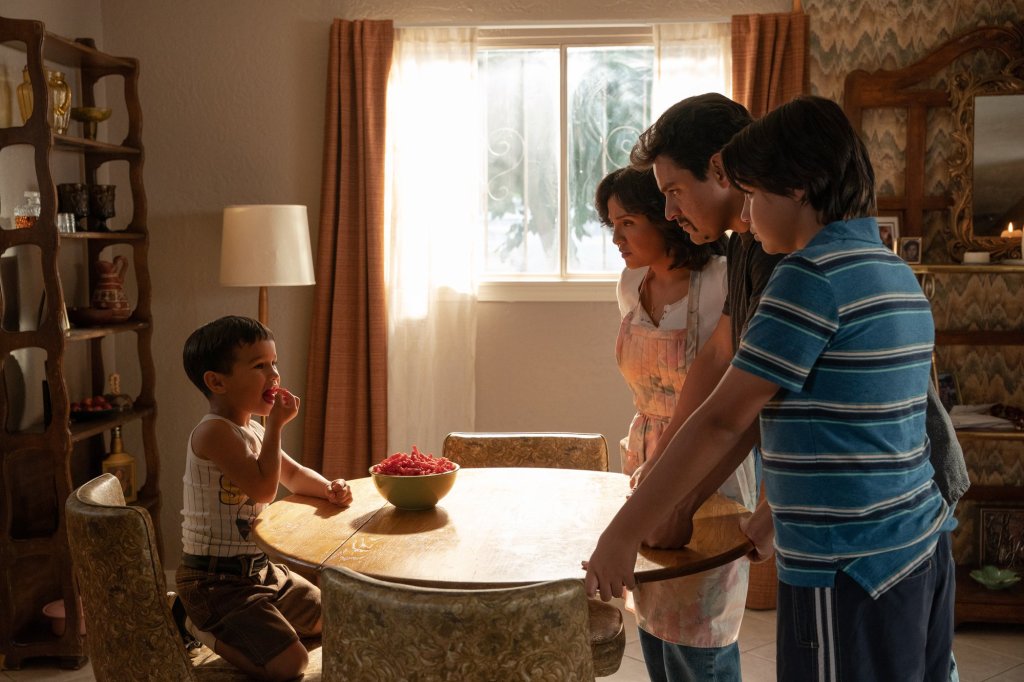
PepsiCo clearly doesn’t dispute enough of the details to withhold their trademarks from the movie, though, and the fact is that Montanez did indeed rise from being a janitor to a corporate executive. As with most biopics, the scenes in between allow for speculation, but the broadest strokes happened. Anyone who’s ever played a game of Telephone knows how oral histories can go.
Talk Is Cheetos
The narration may be a bit much for some, in that it never stops. Richard talks over every scene, which arguably mirrors the fact that Montanez now works as a motivational speaker, and this story is his motivational speech. Still, it’s hard to assess Longoria as a director when her movie doesn’t entirely seem to trust the imagery and editing to get the story across. She does at least take the non-stop talk in some creative directions – in a trick borrowed from Luis in the Ant-Man movies, Montanez sometimes overdubs all the dialogue in corporate boardroom reenactments, where he also imagines the executives gesticulating wildly like gangbangers.
Obviously this story, more than most, has a foregone conclusion – some movie theaters will sell you Flamin’ Hot Cheetos at the concession stand (alas, this is going direct-to-streaming), so it’s not like there’s any chance Montanez is going to fail in his own story. But as my wife put it while watching, “I know he wins, but I’m so excited to see him win.” It’s the quintessential heroic immigrant narrative: Richard is born to migrant workers, faces racism at school that he learns to defuse with home-taught ingenuity, drops out of school to become a criminal, gets cut a break by a lenient judge, and ultimately works himself up from menial jobs again using his ingenuity.
No Bad Guys
His biggest foe is himself and his own self-imposed limitations – indeed, his biggest realization is that in America, cliques are mostly imaginary boundaries. Told to stay away from engineer Clarence C. Baker (Dennis Haysbert), he breaks down the social barriers between them the same way he broke down bullies as a kid: with delicious home cooking. Haysbert plays it like Morgan Freeman in The Shawshank Redemption: he’s the wise veteran too old to be the hero, but in the right place to mentor the next one and reap the rewards of that friendship.
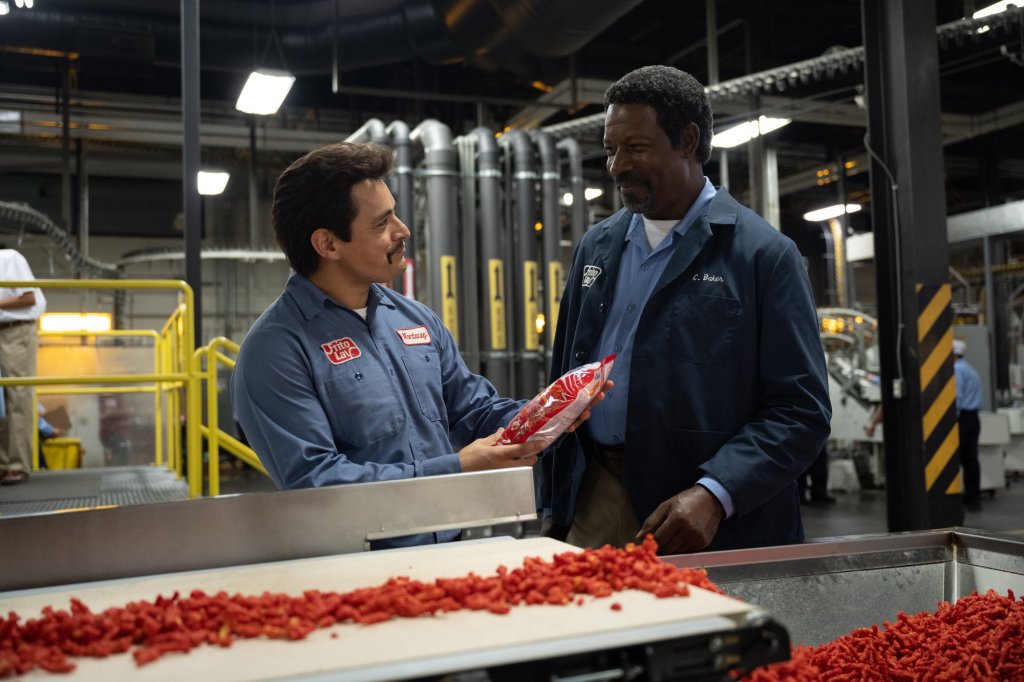
Unlike the snack it celebrates, Flamin Hot burns nobody – it’s eminently palatable, and goes down easy with ample flavor but no pain. It’s less the story of a corn snack than it is the tale of culture as strength, and culinary contribution as possibly the highest embodiment of that. With Christian producer DeVon Franklin involved, it’s no surprise the movie touches on faith as well, so there’s a lot of positive talk about prayer candles. There’s also at least one character who primarily exists to embody Catholic hypocrisy, though he, like the story’s occasional hyperbole, proves ultimately forgivable.
Because even if a healthy chunk of it is BS, well, that’s a big part of the American Dream too.
Grade: 7/10
As ComingSoon’s review policy explains, a score of 7 equates to “Good.” A successful piece of entertainment that is worth checking out, but it may not appeal to everyone.

